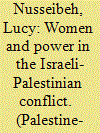|
|
|
Sort Order |
|
|
|
Items / Page
|
|
|
|
|
|
|
| Srl | Item |
| 1 |
ID:
175776


|
|
|
|
|
| Summary/Abstract |
United Nations Security Council Resolution 1325 was full of promise, not just when it was first passed in October 2000 but for many years afterward. It brought hope to women peace activists for a variety of reasons — not least its recognition of the importance, and indeed the necessity, of actively involving women in peace processes. It stressed the need for women’s meaningful participation in negotiations along with the need for protecting, even prioritizing the rights of women affected by war or conflict.
|
|
|
|
|
|
|
|
|
|
|
|
|
|
|
|
| 2 |
ID:
085342


|
|
|
|
|
| Publication |
2008.
|
| Summary/Abstract |
In spite of the full application of all the traditional security measures on the part of Israel in order to achieve security, the majority of Israelis still live in fear. The majority of Palestinians live in fear, too, because of the occupation and Israel's application of these security measures. Thus, neither Palestinians nor Israelis have any sense of security.
|
|
|
|
|
|
|
|
|
|
|
|
|
|
|
|
| 3 |
ID:
130502


|
|
|
|
|
| Publication |
2011.
|
| Summary/Abstract |
Women need to take their power, reconnect on issues of real concern about the future of the region, for both men and women, and take the lead in reframing the approach to security. The situation here is undeniably stuck. It is also unsustainable, and a secure, peaceful and prosperous future for Palestinians and Israelis seems not only highly improbable but also a vision that eludes the imagination. What is more, women seem to be becoming less rather than more visible in the search for this future. Wars begin in the minds of men - so therefore does peace, and so do all our possible futures, stable or unstable, violent or without violence. Peace and wars also therefore begin in the minds of women, so, as women, we need to start to think about the future we would like, and about what power we have to actually make a difference, and how we are going to use that power to bring about a sustainable and prosperous peace. There is clearly a need for new mindsets, for more ideas and creativity. The involvement of women in both formal and informal peace discussion is one of the few ways that traditional mindsets, such as those focused on fear and military security, that are such a major part of the problem, can be transformed. If women are included at all levels of peace talks, and there is a truly gendered approach - with equal representation and respect for the concerns of all members of society - perhaps we could at least be on our way to a sustainable future. We need to start by working with our minds and our creativity, and from our perspective as women. We need to imagine and consider the different options for the future, even if these are all difficult and no longer very desirable, given the compromises that must be involved, and we must insist that our points of view and ideas be heard and acted upon.
|
|
|
|
|
|
|
|
|
|
|
|
|
|
|
|
|
|
|
|
|